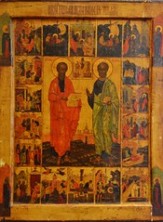[ad_1]

Today on the Orthodox list of saints are the Martyrs Sophia and her three daughters: Faith, Hope, and Love, whose lives were said to come to an end about 137AD. Questions have been raised about whether these were real people or whether their story was created later in history giving characters names based on the words of St Paul: “So faith, hope, love abide, these three; but the greatest of these is love” (1 Corinthians 13:13). Some lists of the lives of saints do not include these martyrs because of the lack of evidence that they existed, or because several contradictory ‘histories’ exist which create confusion or doubt about their veracity, or because their names appeared first as saints in the 6th Century (hundreds of years after they supposedly lived).

The Lives of the Saints was popular Christian literature at one time, which resulted in some ‘lives’ being created for their didactic purposes – they were invented to inspire or instruct the faithful. Over time there was a tendency to add more and more miraculous events in the lives of saints. In the more literalistic thinking of the current scientific age, such created lives sometimes lead people to doubt the story’s veracity or whether the saint ever really existed, especially since the stories were often formulaic or contained such ‘miraculous’ events as to seem not likely to be real. For me, lives of saints which offer me something which I can imitate are far more inspiring than stories full of miracles which are inimitable and seem dubious.

Theodoret of Cyrus (d. 457AD) makes no mention of today’s martyrs when he comments on the St Paul’s use of ‘faith, hope and love’:
… faith is superfluous in the future life, when realities are utterly clarified. After all, if ‘faith is the substance of things hoped for‘ (Hebrews 11:1), there is no use for faith when realities are clarified. Likewise hope too is superfluous there: ‘Hope that is seen is not hope: what is left to hope for in the case of someone who sees?‘ (Romans 8:24) Love, on the other hand, has greater power there, in any case, with the passions gone, bodies made incorruptible and souls no longer choosing this at one time and that at another. (COMMENTARY ON THE LETTERS OF ST PAUL, p 218)

